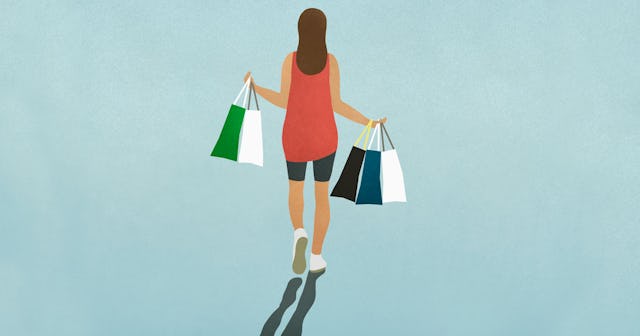Bakery And Liquor Sales Are Up — A Breakdown Of Our Pandemic Spending

A lot of things have changed over the last 10 months. Many individuals now work from home, if they work at all. Unemployment rates have skyrocketed. More than 10 million Americans are still out of work. Children are attending school virtually and/or being homeschooled, and many parts of the country are still locked down. Where I live, bars, restaurants, movie theaters, and various other entertainment venues remain shuttered.
But there have been other, more subtle changes, and one of these changes is where and how we spend our money. Yes, the proverbial tightness of our “purse strings” has been altered. But how has the pandemic impacted our spending habits? Well, according to study conducted by Ibotta, a cash-back app which helps people save money with their everyday purchases, there were some major shifts, particularly at the start of the pandemic.
Here’s a quick breakdown:
- Spirits sales are up 33%
- Bakery items have increased 17%
- Meat, poultry, and seafood purchases have risen 16%
- Condiments, sauces, and seasonings sales are up 15%
- Deli products also saw a 15% increase
- Beauty and grooming products have risen 14%
- Canned goods and soup companies are seeing a 13% uptick in sales
- Wine is up 12%
- Frozen foods are also up 12%
- Health and wellness product sales have increased 10%
Other increases have been noted in household essentials, the beverage industry, and candy — because one can never have too many chocolate bars or paper towels.
As for which industries took a hit, the apparel industry was severely impacted, with the report revealing a drastic 37% decline in sales. Travel, entertainment, and transportation spending is also down. With more Americans working from home, the demand for oil and gas has plummeted, and the retail industry has also been hit. In fact, dozens of retailers declared bankruptcy in 2020, including Brooks Brothers, Ann Taylor, GNC, and Chuck E. Cheese.
Of course, this information is not surprising. I, too, have been drowning my sorrows in booze and baked goods. I’ve been buying toilet paper in bulk, and food delivery expenses — at least in my house — have seen a sharp increase. I order out several times a week. But other expenses have been on the decline. I live in athletic apparel, leggings, and sweats. Shopping for new clothes isn’t exactly a priority. My entertainment expenses have been nearly non-existent, though I did rent “Trolls: World Tour” when it released last spring, and we’ve spent a lot less money on toys. Apparently, I was a sucker for spontaneous Target purchases. But I am not alone. Many have noted similar changes to their families’ spending habits, including Whitney Lang Fleming and Jennifer Rosen Heinz.
“Gas, activity expenses like movies, and extracurricular fees for the high schoolers are way down,” Lang Fleming tells Scary Mommy. “But we added another streaming service and upped our Internet speed, which costs more.”
“I’ve barely bought any clothes and stopped going to the salon to cover my roots every 3 weeks. There have also been very few impulse buys,” Rosen Heinz tells Scary Mommy. “But I am spending on [technology]. We all upgraded our phones and the kid needed a laptop for online learning.” And many others noted similar spending changes. After all, most of us are living, learning, and working at home.
That said, it’s important to note that not all of the aforementioned spending changes are practical or even predictable. Nicole Sullivan, a mom of three, told Scary Mommy she’s been buying croutons — yes, pre-made croutons — in bulk. Amanda Muchnok Mushro revealed she buys items advertised on TikTok. “Makeup, vacuum cleaners, toys. If I see a TikTok where people say they like it — I buy it.” And numerous individuals admitted they have been stocking (see also: hoarding) things like crafting, organizing, and baking supplies.
Who knew cupcake liners and vanilla extract would be hot commodities?
“With all of the changes we experienced in 2020, it’s only natural that consumer shopping habits would have changed as well,” Bryan Leach, the founder and CEO of Ibotta, tells Scary Mommy. “Increases in items like bakery goods, beverages and even spirits, make sense given how much time we are spending at home versus going to our favorite local coffee shop or bar.”
When asked how our spending habits may change in 2021, Leach admitted he does not know; however, he expects things to remain (more or less) the status quo. “While we expect some shopping habits to return to normal, some of the new normal will likely persist,” Leach said. “Many, for example, will continue to buy their groceries online and the emergence/increase of buy online and pick-up in-store or curb side are trends that are, more likely than not, here to stay.”
This article was originally published on